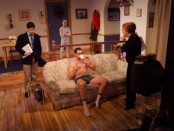Bathsheba’s Psalms, Or a Woman of Unusual Beauty Taking a Bath
Ranger spins the story for a 2019 audience mindful of and vigilant about sex and gender issues—especially those involving consent, privilege and toxic masculinity. The play transpires in a sort of limbo-like dimension that is part Iron Age and part near-future. It’s a world in which the old gender rules are fully in play. Powerful men can take and then discard women as they please, and if a woman goes to a pharmacy to pick up a morning-after pill, she’ll get turned down with sneering derision: “We’re a Christian nation now. No more murdered babies on our hands.” [more]











